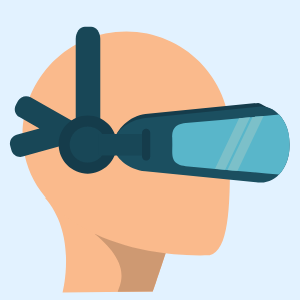Eyecare Industry News: The Future of Optical Technology
Trends in the optical world these days don’t seem to last very long. With a constantly changing environment, it can be tough to know which trends are legit and which will fall out quickly.
A major factor to these developments is technological innovation surrounding eyewear. Brands are constantly pushing the envelope on what they can include with their products and what will sell in today’s fast-paced environment.
Our friends at The Optical Vision Site posted, Will Smart Glasses Change The Way We Shop?, to convey that Smart Glass and Augmented Reality (AR) eyewear is the supposed answer to the future of frames. This guest post will go through the development and execution of these products in the market, and what trends to look out for. The threat of this technology is explored, and the threat of competition from tech giants is combated.
Eyecare Industry News: Innovation in Augmented Reality
 Over the last 30+ years in the eyecare industry, there have been many “trends” that eyecare professionals have ignored thinking “it won’t effect” them. Think about: 1-800CONTACTS, Big Box Optical, Wal-Mart, One Hour Glasses, Online Optical, and Warby Parker. Each of those brought major changes to the optical industry and many eyecare providers were not listening and adapting to new paradigms.
Over the last 30+ years in the eyecare industry, there have been many “trends” that eyecare professionals have ignored thinking “it won’t effect” them. Think about: 1-800CONTACTS, Big Box Optical, Wal-Mart, One Hour Glasses, Online Optical, and Warby Parker. Each of those brought major changes to the optical industry and many eyecare providers were not listening and adapting to new paradigms.
Smart Glasses/AR is another big trend in the optical market. If you think you have a problem with online shoppers now, it will only get worse as the technology and the “coolness” of AR integrates into the shopping mainstream. Add in the ease of payment with programs like Apple Pay and Google Wallet, and you can see the threat this poses.
In the past, AR glasses have been for gamers. In today’s age, you can do almost anything with AR and it’s compatible glasses. Things like trying on clothes, decorating/building houses, designing products, visiting museums and parks, taking a hike, or going on a trip all from the comfort of home. As technology evolves and makes AR relevant it will change the way we live our lives. Web stores will embrace 3D as a shopping experience, making it easier to browse and shop. Brick and mortar locations will most likely, in order to compete, have to embrace this technology. But there are cons to the technology, which can give you the advantage you need to fight back against these well-funded tech innovations.
Smart glasses, including AR and virtual reality, no doubt will change the way people shop. The findings in a survey with more than 1,400 consumers by Walker Sands 2015 Future of Retail Study's shows:
- 35% would do more online shopping if they were able to try on a products virtually using a device like Oculus Rift (bought by Facebook for $2 Billion in 2014).
- 49% of survey participants are interested in trying Oculus Rift once it comes out this summer.
- 32% would be interested in purchasing such a product.
- 66% would be interested in virtual shopping.
- 63% expect such capabilities to change the way they shop.
- 22% indicated they would be less likely to visit a physical store with the introduction of such technology
What can eyecare professionals do now to prepare for this?
1.) Beef up your customer service. Nothing will replace the one to one interactions. Re-define your customer service policies, and define what is working and what is not.
2.) Promote comfort and fit in your sales and marketing. Fit is the #1 reason that customers return clothing.
3.) Promote the experience. Start having Trunk Shows and other events to entice the consumer.
4.) Enhance your website to make it more interesting and exciting. Showcase the products you carry. Consider adding a blog with lots and lots of pictures.
5.) Consider adding a fitting box or another virtual try on technology on your website.
6.) Consider ‘Personalization’ a huge trend. Whether it’s 3D Eyewear, custom, or Bespoke Eyewear that your patients can design their own.
7.) Re-examine your product mix. Do you have fun and unique products?
8.) Train your staff well, not just in product offerings, but in customer service. Your staff are your brand ambassadors and you can train and educate them to be so.
9.) Promote shopping local. This you can do today very easy with signage and on your website.
10.) Merchandise should be inspirational, captivating, and entertaining. One of the biggest advantages to Brick and Mortar locations is the sensory experience. That goes from your furnishings to your displays.
11.) Track, track, and track some more. Using software like Edge, will help determine what your patients are buying. Surveying your patients as to what they want, demographics, and more will help you drill down your current patients’ needs and wants.
Eyecare professionals have about 2 more years to ramp up their marketing for Virtual Reality Shopping. Smart Glass and AR techonology are only going to start popping up in the eyecare industry news more frequently, so this is the time to analyze what you have and start to make changes.

